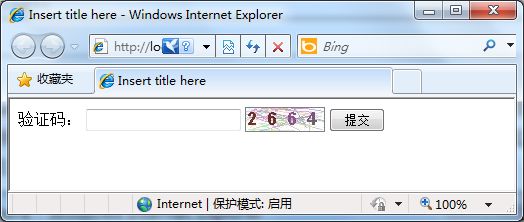在Web程序中,验证码是经常使用的技术之一。Web程序永远面临未知用户和未知程序的探测。为了防止恶意脚本的执行,验证码技术无疑是首选方案之一。本文将讨论如何在JSP和Servlet中使用验证码技术。
验证码的产生思路很简单,在Servlet中随机产生验证码字符序列,并计入session中,JSP中以图片的形式进行显示。当用户在JSP表单中输入验证码并提交时,在相应的Servlet中验证是否与session中保存的验证码一致。下面通过代码,一次演示验证码产生和实现的验证的过程。
1.验证码的产生
我们需要创建一个名为ValcodeServlet的servlet并在其doGet()方法中完成验证码的产生。首先通过随机数的产生类Random随机产生一个4位的验证码,并将其存入session;然后使用BufferedImage和Graphics类把验证码转为图片,当然为了起到较好的效果,我们需要添加一些干扰线;最后使用ImageIO将图片输出。详细代码如下:
protectedvoiddoGet(HttpServletRequest request, HttpServletResponse response) throwsServletException, IOException { // 告知浏览当作图片处理 response.setContentType("p_w_picpath/jpeg");
// 告诉浏览器不缓存 response.setHeader("pragma", "no-cache"); response.setHeader("cache-control", "no-cache"); response.setHeader("expires", "0");
// 产生由4位数字构成的验证码 int length = 4; String valcode = ""; Random rd = new Random(); for(int i=0; i<length; i++) valcode+=rd.nextInt(10);
// 把产生的验证码存入到Session中 HttpSession session = request.getSession(); session.setAttribute("valcode", valcode);
// 产生图片 int width = 80; int height = 25; BufferedImageimg = newBufferedImage(width, height,BufferedImage.TYPE_INT_RGB);
// 获取一个Graphics Graphics g = img.getGraphics();
// 填充背景色 g.setColor(Color.WHITE); g.fillRect(0, 0, width, height);
// 填充干扰线50 for(int i=0; i<50; i++){ g.setColor(new Color(rd.nextInt(100)+155,rd.nextInt(100)+155,rd.nextInt(100)+155)); g.drawLine(rd.nextInt(width), rd.nextInt(height),rd.nextInt(width), rd.nextInt(height)); }
// 绘制边框 g.setColor(Color.GRAY); g.drawRect(0, 0, width-1, height-1);
// 绘制验证码 Font[] fonts = {new Font("隶书",Font.BOLD,18),new Font("楷体",Font.BOLD,18),new Font("宋体",Font.BOLD,18),new Font("幼圆",Font.BOLD,18)}; for(int i=0; i<length; i++){ g.setColor(new Color(rd.nextInt(150),rd.nextInt(150),rd.nextInt(150))); g.setFont(fonts[rd.nextInt(fonts.length)]); g.drawString(valcode.charAt(i)+"", width/valcode.length()*i+2, 18); }
// 输出图像 g.dispose(); ImageIO.write(img, "jpeg", response.getOutputStream()); } |
上面的代码只是产生了一个常规的验证码,我们可以根据自己的需要对验证码的产生策略和干扰线进行调整。Servlet编写完毕,别忘了在web.xml中进行配置以便能在JSP中调用,其代码如下:
<servlet> <description></description> <display-name>ValcodeServlet</display-name> <servlet-name>ValcodeServlet</servlet-name><servlet-class>org.icer.jee.valcode.servlet.ValcodeServlet</servlet-class> </servlet> <servlet-mapping> <servlet-name>ValcodeServlet</servlet-name> <url-pattern>/ValcodeServlet</url-pattern> </servlet-mapping> |
2.验证码的显示
产生验证码的servlet编写完毕,并且已经web.xml中进行了配置,那么我们在input.jsp中使用<img />标记以图片的方式调用servlet即可显示验证码。
p
当然为了能起到验证效果,本例中还包含了简单的表单。为了放置验证码无法识别,此处还提供了看不清点击换一张功能,用户点击图片时重新加载验证码图片(问号是为了放置浏览器缓存而不能实现重新请求图片)。JSP中表单部分代码如下:
<formname="form1"method="post"action="LoginServlet"> 验证码: <inputname="vcode"type="text"class="input02"id="vcode"> <imgsrc="ValcodeServlet"align="absmiddle"title="看不清,点击换一张"onClick="this.this.src+'?'"< /span>/> <inputtype="submit"name="button"id="button"value=" 提交 "> </form> |
3.实现验证功能
当表单提交到CheckServlet时,对用户填写的验证码和session中存储的验证码进行比对,根据结果给出不同提示。代码如下:
protectedvoiddoPost(HttpServletRequest request, HttpServletResponse response) throwsServletException, IOException { // 获取验证码 String valcode = request.getSession().getAttribute("valcode").toString(); // 获取用户填写的验证码 String vcode = request.getParameter("vcode"); // 进行验证 if(!valcode.equals(vcode)) System.out.println(">>>验证码错误!"); else System.out.println(">>>验证码正确!"); } |
上面只是根据验证情况在控制台进行了输出,使用时根据实际的业务逻辑需求进行修改即可。
总起来说,验证码技术本质上就是利用Java绘图技术把随机产生的验证码字符图形化,并在JSP中以图形调用,最后在用户提交表单后在对应的servlet中进行验证。本文只是提供验证码的基本实现思路,希望大家能灵活应用。
作者:中软卓越天津ETC
转载于:https://blog.51cto.com/zretc/1219547





















 1万+
1万+











 被折叠的 条评论
为什么被折叠?
被折叠的 条评论
为什么被折叠?








